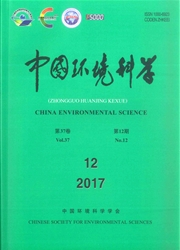

 中文摘要:
中文摘要:
采用Methylibium petroleiphilum PM1降解甲基叔丁基醚(MTBE),检测了MTBE代谢中间产物,并分析其代谢途径.结果表明,PM1降解MTBE的过程中伴有细胞的生长,但细胞得率较低.利用气相色谱-质谱联用仪和离子色谱检测到叔丁醇(TBA)、2-羟基异丁酸和甲酸等中间产物.PM1能快速降解甲酸叔丁酯、TBA和丙酮,异丙醇强烈抑制MTBE的降解,推测异丙醇可能不是MTBE的代谢中间产物.以乙醇为底物培养的细胞降解MTBE需要经历一段延滞期,结合蛋白电泳实验,推测MTBE降解酶可能为诱导酶.
 英文摘要:
英文摘要:
The intermediates of the degradation of methyl tert-butyl ether (MTBE) by Methylibium petroleiphilum PM1 were detected, and the metabolic pathway was proposed in this paper. The biomass gradually increased with a rather low cell yield as MTBE degradation proceeded under the mentioned conditions. Ten-butyl alcohol (TBA) accumulated was detected by gas chromatograph-mass spectrometry. 2-hydroxy isobutyrate and formic acid were also detected by ion chromatography. It was observed that tert-butyl formate, TBA and acetone were quickly degraded by PM1. MTBE degradation was strongly inhibited by isopropanol, which suggested that isopropanol was not the intermediate of MTBE degradation. Furthermore, MTBE was degraded by ethanol-grown cells of PM1 following a lag period. Gel electrophoresis of proteins in cells grown in different media suggested that the enzymes responsible for MTBE degradation might be inducible.
 同期刊论文项目
同期刊论文项目
 同项目期刊论文
同项目期刊论文
 期刊信息
期刊信息
